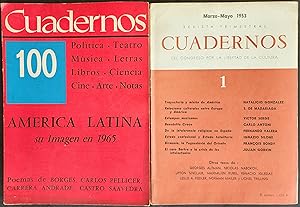Riguardo questo articolo
In-4. #1 Mar/May 1953 - #100 Sep 1965. Plus the rare Suplemento to the #46 (96 Issues of 100 lacks #3, 19, 78, 90). Wrappers. Collaborators : Borges Jorge Luis, Alfonso Reyes, Jules Romains, Víctor Alba, Luis Araquistain, Germán Arciniegas, Raymond Aron, Roger Caillois, José Carner, Jean Cassou, Michel Collinet, R. García Treviño, Gironella, G. Glaser, Fred Goldbeck, Natalicio González, Jean Guehenno, Sidney Hood, Karl Jaspers, Pierre-Jean Jouve, René Lalou, Rodolfo Llopis, Claude-Edmonde Magny, Gabriel Marcel, Thierry Maulnier, Joaquín Maurín, Czeslaw Milosz, Federica Montseny, André Philip, Th. Plievier, Fr. Ponge, Héctor Raurich, Linz do Rego, Eduardo Santos, Ignazio Silone, Stephen Spender, Jules Supervielle, Arnold J. Toynbee, Lionello Venturi, Wladimir Weidle, Among others. The Congress for Cultural Freedom, an anti-communist organization promoted by the USA, supervised and financed directly by the CIA, began its public journey in June 1950, in Berlin, and soon set up its headquarters in Paris (initially at 41 Avenue Montaigne ). Cuadernos was a Spanish-language magazine that was published in Paris, France, in the period 1953 1965. Its full title was Cuadernos del Congreso por la Libertad de la Cultura. It was one of the publications of the Congress for Cultural Freedom. Cuadernos was launched by the Congress for Cultural Freedom in 1953 which targeted Spanish people and Latin Americans. The first issue appeared in May 1953. Cuadernos was based in Paris, and its editor was a Spaniard politician, Julián Gorkin. During his editorship another Spaniard politician Ignacio Iglesias also edited the magazine which was published on a quarterly basis. Gorkin was replaced by a Spaniard exile in Paris, Luis Araquistáin, as editor of the magazine in 1959. However, due to the death of Araquistáin a Colombian diplomat Germán Arciniegas was named as the editor of the magazine. During the editorship of Gorkin between 1953 and 1959 Cuadernos contained only one article which included an overt ideological imposition in favor of the American policies, and it was about the Guatemalan coup d'état in 1954 and the fall of Jacobo Árbenz s government. The magazine featured Hispanic poems, articles on anti-Soviet propaganda and political and cultural news from the European and Latin American countries. In line with the premises of the Congress for Cultural Freedom the magazine argued that the avant-garde or experimental approach towards art was possible only in a society depending on the free enterprise and liberal individualism. The avant-garde approach was also regarded by the magazine as an indication of the developed societies.In 1961 the frequency of Cuadernos was switched to monthly. The magazine was closed by the Congress in 1965 due to its low popularity and its lower levels of circulation although it targeted Hispanic people in Spain and Latin America. The magazine never enjoyed high levels of circulation like Encounter or Der Monat, other magazines of the Congress. Cuadernos was a quarterly magazine during 1953 (issues 1, 2 and 3), from 1954 it became bimonthly, and monthly from issue 48 (May 1961), until its last issue, 100 (September 1965). Mundo Nuevo, another Spanish language magazine, succeeded Cuadernos. Codice articolo ABE-1709946895396
Contatta il venditore
Segnala questo articolo
![]()
